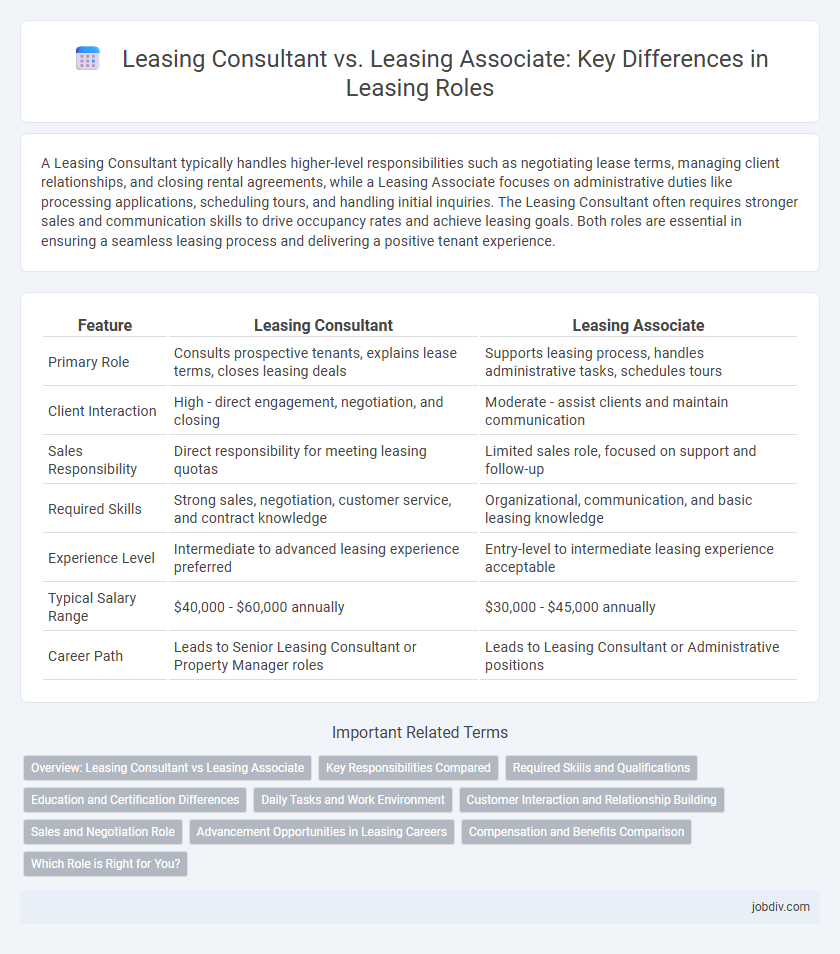A Leasing Consultant typically handles higher-level responsibilities such as negotiating lease terms, managing client relationships, and closing rental agreements, while a Leasing Associate focuses on administrative duties like processing applications, scheduling tours, and handling initial inquiries. The Leasing Consultant often requires stronger sales and communication skills to drive occupancy rates and achieve leasing goals. Both roles are essential in ensuring a seamless leasing process and delivering a positive tenant experience.
Table of Comparison
| Feature | Leasing Consultant | Leasing Associate |
|---|---|---|
| Primary Role | Consults prospective tenants, explains lease terms, closes leasing deals | Supports leasing process, handles administrative tasks, schedules tours |
| Client Interaction | High - direct engagement, negotiation, and closing | Moderate - assist clients and maintain communication |
| Sales Responsibility | Direct responsibility for meeting leasing quotas | Limited sales role, focused on support and follow-up |
| Required Skills | Strong sales, negotiation, customer service, and contract knowledge | Organizational, communication, and basic leasing knowledge |
| Experience Level | Intermediate to advanced leasing experience preferred | Entry-level to intermediate leasing experience acceptable |
| Typical Salary Range | $40,000 - $60,000 annually | $30,000 - $45,000 annually |
| Career Path | Leads to Senior Leasing Consultant or Property Manager roles | Leads to Leasing Consultant or Administrative positions |
Overview: Leasing Consultant vs Leasing Associate
A Leasing Consultant typically handles client interactions, property showings, and lease agreement negotiations to secure tenants, while a Leasing Associate supports administrative tasks and assists with marketing efforts. Leasing Consultants require strong sales skills and in-depth property knowledge, whereas Leasing Associates focus more on clerical and customer service responsibilities. Both roles are essential in property management teams, but the Leasing Consultant plays a more direct role in tenant acquisition.
Key Responsibilities Compared
Leasing Consultants primarily focus on generating new leases by conducting property tours, negotiating lease terms, and closing deals with prospective tenants, ensuring occupancy targets are met. Leasing Associates handle day-to-day administrative tasks such as processing rental applications, maintaining leasing databases, and coordinating communications between tenants and management to support seamless operations. Both roles collaborate closely but differ in their emphasis on direct tenant interaction versus operational support within the leasing process.
Required Skills and Qualifications
Leasing Consultants typically require strong sales skills, in-depth knowledge of property management, and proficiency in customer relationship management software. Leasing Associates often need excellent communication abilities, organizational skills, and experience with lease documentation and basic administrative tasks. Both roles demand attention to detail, customer service expertise, and familiarity with local leasing laws and regulations.
Education and Certification Differences
Leasing Consultants typically require a higher level of education, often holding an associate or bachelor's degree in business, real estate, or a related field, whereas Leasing Associates may only need a high school diploma or equivalent. Certification for Leasing Consultants often includes industry-recognized credentials such as the Certified Apartment Leasing Professional (CALP) or National Apartment Leasing Professional (NALP) designations, which demonstrate advanced knowledge in leasing laws, customer service, and property management. Leasing Associates usually receive on-the-job training with optional certifications focusing on entry-level leasing skills and compliance basics.
Daily Tasks and Work Environment
Leasing Consultants primarily handle property tours, lease negotiations, and client relationship management, focusing on securing new tenants and maintaining occupancy rates. Leasing Associates support these efforts by managing administrative duties such as processing applications, coordinating maintenance requests, and updating tenant records in property management software. Both roles operate within fast-paced real estate offices or residential communities, requiring strong communication skills and a customer-service-oriented mindset to enhance leasing efficiency.
Customer Interaction and Relationship Building
Leasing Consultants typically engage in in-depth customer interactions, guiding prospects through property tours and lease negotiations with a personalized approach to build trust and long-term relationships. Leasing Associates handle initial inquiries and application processing, providing prompt and efficient service to ensure a positive first impression and customer satisfaction. Both roles prioritize effective communication, but Leasing Consultants emphasize relationship building to increase lease conversion and resident retention.
Sales and Negotiation Role
Leasing Consultants primarily focus on sales strategies and client negotiations to maximize occupancy and revenue, often presenting property features persuasively and closing lease agreements. Leasing Associates support these efforts by handling administrative tasks and initial client interactions but typically have less autonomy in negotiation and sales decision-making. Effective leasing teams balance these roles to enhance tenant acquisition and retention through targeted sales approaches and responsive negotiation skills.
Advancement Opportunities in Leasing Careers
Leasing Consultants typically have greater advancement opportunities due to their experience in client negotiations, property tours, and closing deals, positioning them for roles such as Leasing Manager or Property Manager. Leasing Associates often start with administrative duties and lease documentation, building foundational skills that enable progression to Leasing Consultant roles. Career growth in leasing emphasizes hands-on experience, client relationship management, and comprehensive knowledge of leasing laws and property management software.
Compensation and Benefits Comparison
Leasing Consultants typically earn higher base salaries compared to Leasing Associates, reflecting their advanced responsibilities in securing tenant agreements and managing client relationships. Benefits packages for Leasing Consultants often include performance bonuses, commission opportunities, and enhanced health insurance plans, distinguishing them from the more basic benefits provided to Leasing Associates. Leasing Associates usually receive standard hourly wages with limited bonus potential and fewer perks, emphasizing their support role in leasing operations.
Which Role is Right for You?
Leasing Consultants typically manage client relations and handle lease agreements, making them ideal for professionals skilled in communication and negotiation. Leasing Associates focus more on administrative tasks, property tours, and supporting leasing operations, suitable for those who prefer operational roles. Choosing between these roles depends on whether you thrive in client-facing responsibilities or prefer behind-the-scenes coordination.
Leasing Consultant vs Leasing Associate Infographic

 jobdiv.com
jobdiv.com